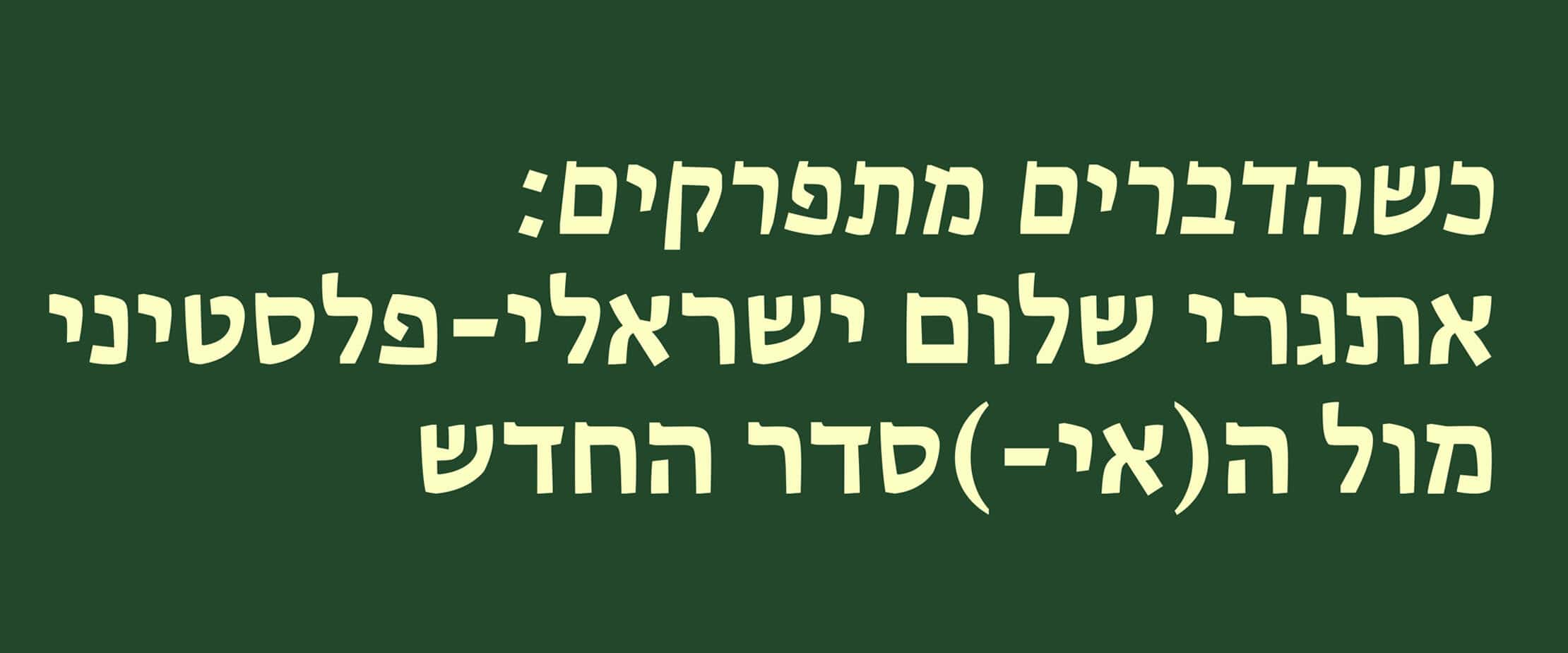The Third Israeli–Palestinian Partnership-Based Peace Conference
Thursday | 29.05.25

Call for Proposals by Potential Participants in the Third Israeli–Palestinian Partnership-Based Peace Conference
When Things Fall Apart: The Challenges of an Israeli–Palestinian Peace in the Face of the New (Dis)order
The Shemesh Center for the Study of a Partnership-Based Peace, (forthcoming) at the Van Leer Jerusalem Institute, invites scholars and experts in diverse fields to present proposals for the third annual conference on an Israeli-Palestinian partnership-based peace. This year the conference will be taking place at a time of unprecedented threats to the Palestinian people and the political order in the Middle East and beyond. These threats generate political, economic, cultural, and strategic uncertainty and pose a huge challenge to us. In light of the local disaster and the intensified processes that are undermining the regional and world order, we aim to examine how multidisciplinary academic and practical knowledge can help in understanding the current reality by formulating alternatives to it and by identifying processes that can lay the foundations for the end of the occupation and the establishment of sustainable peace and reconciliation.
The conference will take place at the Van Leer Jerusalem Institute, May 29, 2025
Background and the Conference Topic
The violence that has swept Israel since October 7, 2023, and above all the catastrophic destruction of the Gaza Strip and its population, demonstrate the terrible price of the Israeli strategies for “managing” the Israeli-Palestinian conflict and the attempt to resolve it solely by force, with the aim of eradicating Palestinian nationality. On the Palestinian side, the strategy that includes armed resistance and occasional terrorism, contributes to the unending cycles of bloodshed. The current extent of support for the plan to “transfer” the Palestinian population out of Gaza illustrates the dangers embodied by the current leadership and the manner of thinking of the Israeli public. These leave the two peoples on a track of continuing conflict and bloodshed, with no prospect of peace.
This continuing and multifaceted violence is not taking place in a vacuum, but rather intertwined with internal processes of collapse in the Israeli, Palestinian, regional, and global arenas that indicate the acceleration of the attempt to disrupt the world order that developed after World War Two. In light of this situation, the need for an alternative vision—one founded on fair and peaceful political arrangements rather than war, the defeat of the opponent, or transfer—has never been clearer and more urgent.
The Shemesh Approach and the Current Challenges
The approach of partnership-based peace (the Hebrew acronym for this approach is Shemesh) is based on the international political and legal order that developed after World War Two, but aims to update and adapt it to the realities in areas of intractable group conflict. The premises of Shemesh are that two peoples live in the Land of Israel/Palestine equal in their value and rights, and that securing their future without occupation, violence, and suppression is the key to a future of stability and prosperity. On the basis of these principles, the Shemesh approach holds that sustainable political arrangements cannot be based solely on sovereignty and independence in the sense of segregation and an absence of dependence; instead, it is necessary to adopt arrangements that combine independence and partnership, coexistence and separate existence. However, despite the necessity of an Israeli-Palestinian partnership, in the wake of October 7 and the Gaza war, any discussion of it seems detached from the physical, moral, political, and psychological realities of the two peoples now more deeply divided than ever. This challenge lies at the heart of the current conference, where we seek to generate new insights on the path forward.
Examples of Possible Topics for Proposals
About the current crisis and its effects
- Transfer and ethnic conflicts – an international perspective
- Ramifications of annexing the West Bank to Israel – scenarios and trends
- Geopolitics of neo-imperialism and regional dis-order – dangers and opportunities in the new trends
- Defending against existential threats
- Law, community, and international institutions– threats and opportunities
- Politics of feelings and representations of reality – “The Present Day” document as an example
Processes of transition, transformation, and change
- The Palestinian and Jewish discourse about the future of the land
- Processes of transition from conflict to reconciliation – theory and practice of processes of transition in intractable conflicts
- Security – What is the difference between security as preparation for war and the view of defense as preparation for peace? What can be learned from security arrangements and processes for re-establishing security in other conflict areas?
- Cross-border Bi-nationalism – challenges and obstacles to partnership; enabling conditions; learning from historical experience and from other places; civil society and the shared space in times of crisis; areas in which partnership is possible and effective
- How to talk to our national communities now?
- Decolonization? Processes of dismantling mechanisms of oppression – a historical and comparative view
Submitting a Proposal
The steering committee invites scholars from various disciplines and research methodologies as well as individuals who engage with this topic in civil society organizations to submit proposals related to the conference topic. The proposal must include the following details: (1) Full name and academic or organizational affiliation; (2) An abstract of up to 200 words.
Select presentations will be able to be published as brief articles of 1,000–1,500 words, as part of the Shemesh Center’s publications.
The final date for the submission of proposals: April 11, 2005.
Proposals should be submitted to pbp@vanleer.org.il with the following subject line: Proposal for the Third Annual Conference on a Partnership-Based Peace 2025
The Conference’s Steering Committee
Limor Yehuda, The Van Leer Jerusalem Institute and The Hebrew University of Jerusalem
Ameer Fakhoury, The Polonsky Academy and the Nissan Center, The Van Leer Jerusalem Institute
Oren Yiftachel, Department of Environmental, Geoinformatics and Urban Planning Sciences, Ben-Gurion University of the Negev
Rawia Aburabia, Sapir Academic College
Ron Dudai, Ben-Gurion University of the Negev
